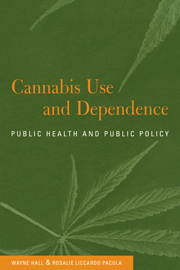Book contents
- Frontmatter
- Dedication
- Contents
- List of figures and tables
- Foreword
- Acknowledgements
- 1 Introduction
- Section 1 Cannabis the drug and how it is used
- Section 2 The health effects of cannabis
- Section 3 The psychological effects of chronic cannabis use
- Section 4 Effects on adolescent development
- Section 5 Harms and benefits of cannabis use
- Section 6 The effectiveness and costs of cannabis prohibition
- 14 The impact of prohibition on cannabis use
- 15 The monetary cost of enforcing prohibition
- 16 Other costs of cannabis prohibition
- Section 7 Policy alternatives
- Appendix 1
- Appendix 2
- References
- Index
14 - The impact of prohibition on cannabis use
from Section 6 - The effectiveness and costs of cannabis prohibition
Published online by Cambridge University Press: 05 July 2016
- Frontmatter
- Dedication
- Contents
- List of figures and tables
- Foreword
- Acknowledgements
- 1 Introduction
- Section 1 Cannabis the drug and how it is used
- Section 2 The health effects of cannabis
- Section 3 The psychological effects of chronic cannabis use
- Section 4 Effects on adolescent development
- Section 5 Harms and benefits of cannabis use
- Section 6 The effectiveness and costs of cannabis prohibition
- 14 The impact of prohibition on cannabis use
- 15 The monetary cost of enforcing prohibition
- 16 Other costs of cannabis prohibition
- Section 7 Policy alternatives
- Appendix 1
- Appendix 2
- References
- Index
Summary
The primary justification for criminalising the cultivation, sale, possession and use of cannabis is to deter its use in order to reduce the adverse health effects of cannabis use, especially long-term regular cannabis use. Critics of prohibition argue that the high rates of cannabis use, particularly among young adults, are clear evidence that the policy has failed to achieve its goal (Single et al., 1999; Lenton, 2000; Senate Special Committee on Illegal Drugs (Canada), 2002). The available survey data provides strong support for the claim (see Chapter 3).
In the United Kingdom in 2000, for example, 9% of persons between the ages of 16 and 59 reported using cannabis in the past year (Drugscope, 2001). Rates of use in the past year among youth (ages 16-19) and young adults (ages 20-24) were 25% and 27%, respectively (Drugscope, 2001). In the United States in 2000, 8% of the household population (ages 12 and older) reported using cannabis in the past year (Substance Abuse and Mental Health Services Administration, 2001). Rates among youth and young adults were 13% (ages 12 to 17) and 24% (ages 18 through 25) (Substance Abuse and Mental Health Services Administration, 2001). Rates of use in household surveys in Australia in 1998 were even higher, with 18% of individuals 14 years and older reporting use in the past year (Higgins et al., 2000). Estimates from other developed countries are similar to those presented here (see Chapter 3). All clearly show that prohibition of the sale and possession of cannabis has not eliminated the use of cannabis, rates of which are increasing in many of these countries.
Those who defend cannabis prohibition point out that very few laws eliminate an unwanted behaviour, whether it is income tax evasion, speeding, prostitution, gambling, abortion or substance use. The use of cannabis, they argue, would have been much higher if its use was not prohibited (e.g. Nahas and Latour, 1992). Research on lifetime patterns of cannabis use provide some support for this argument. This shows that most cannabis use (which is typically initiated in mid- to late adolescence) is intermittent and largely discontinued during the mid- to late twenties (see Chapter 3).
- Type
- Chapter
- Information
- Cannabis Use and DependencePublic Health and Public Policy, pp. 159 - 164Publisher: Cambridge University PressPrint publication year: 2002



